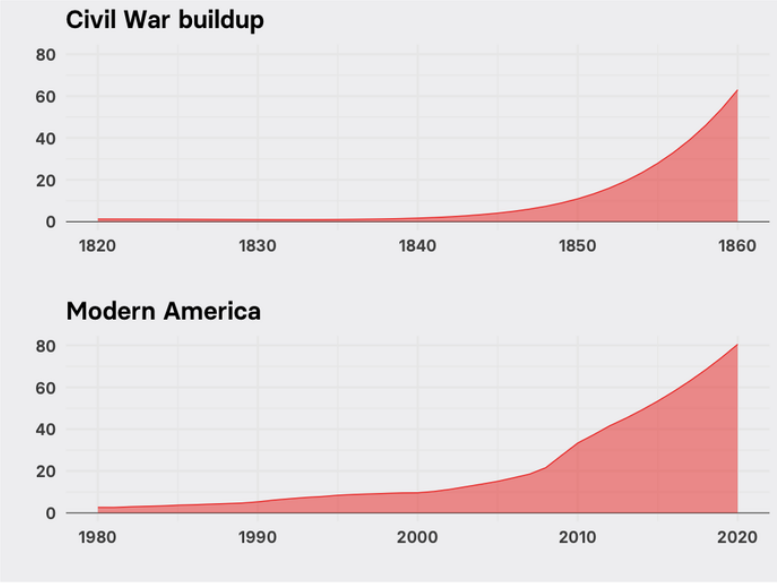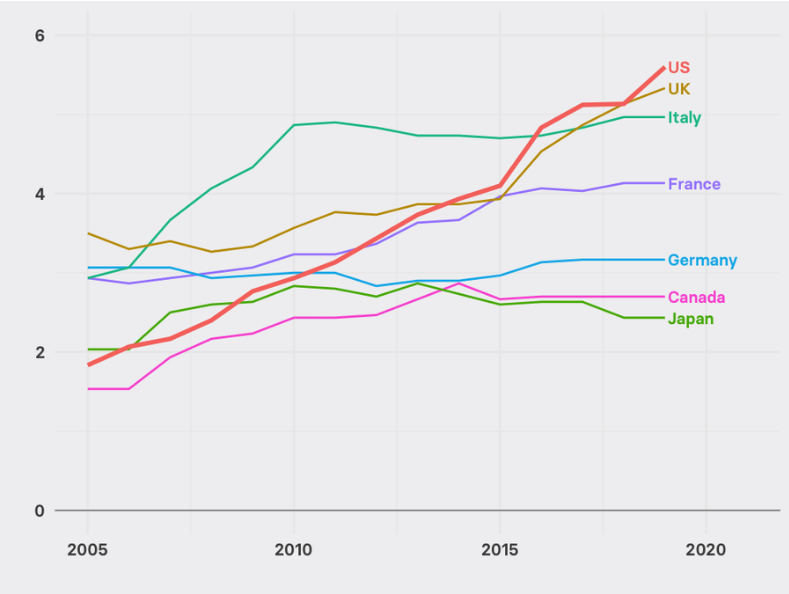Two academics caution that there will be a huge political turmoil in the U.S. ahead, and the outcome of the upcoming presidential election won't change the course, according to a BuzzFeed article.
The current turmoil in the U.S., combined with a pandemic and the social movement escalated into violent riots rattled by President Donald Trump's reckless rhetoric, makes the nation looks like a powder keg that is waiting to blow.
However, according to Peter Turchin, an evolutionary anthropologist at the University of Connecticut, the worst is yet to come.
Turchin has developed a political stress indicator, or PSI, which incorporates measures of wage stagnation, national debt, competition between elites, distrust in government, urbanization, and the age structure of the population. The researchers believe their model can explains how inequality escalated and leads to political instability.
"The tendency is to blame Trump, but I don't really agree with that," Turchin said. "Trump is really not the deep structural cause."
Turchin once predicted the instability would peak in around the year 2020 based on the PSI, and warned that, "In the United States, we have stagnating or declining real wages, a growing gap between rich and poor, overproduction of young graduates with advanced degrees, and exploding public debt. Historically, such developments have served as leading indicators of looming political instability."
The PSI curve during America's darkest time in the 1860s during the Civil War shares the same pattern with the PSI curve at the moment. This could mean the country is on the way to the second civil war, and the 2020 election can be the potential "fire-starter" event, said Turchin.

The political stress indicator curve is similar to before the Civil War. /BuzzFeed News
The political stress indicator curve is similar to before the Civil War. /BuzzFeed News
George Mason University sociologist Jack Goldstone, who once worked on a CIA project to predict when a country is likely to spiral into chaos, was also convinced by Turchin's findings.
He didn't think of applying his model from CIA project on the U.S. until he saw the findings of Turchin's.
George told BuzzFeed News that Turchin's PSI has heralded a disturbing future for the U.S. that won't be solved by politics as usual after the 2020 election, even if Trump is defeated and goes quietly. "If those trends continue after Trump departs, then the risks and the occurrence of violence will likely continue."
One key concern, according to Goldstone, is that people across the political spectrum have lost faith in government and political institutions.
"In short, given the accumulated grievances, anger and distrust fanned for the last two decades, almost any election scenario this fall is likely to lead to popular protests on a scale we have not seen this century," he and Turchin wrote in a recent article published by the Berggruen Institute, a think tank based in Los Angeles. This would hurtle the U.S. into a period of political instability the researchers dubbed "the turbulent twenties."
Turchin said people who rule out the possibility of serious political violence in the US based on "the strength of American institutions" are being "unduly optimistic."
"The social system that we live in is extremely fragile," Turchin said.

The Fragile States Index of G7 countries. /BuzzFeed News
The Fragile States Index of G7 countries. /BuzzFeed News
The PSI isn't the only indicator that has set alarm bells ringing about the stability of the U.S. The Fund for Peace, a nonprofit based in Washington, D.C., has developed a measure called the Fragile States Index (FSI) that seeks to identify nations that are at risk of violence and instability from a range of underlying pressures including economic distress, refugee flows, and their record on human rights.
Overall, the U.S. looks reasonably healthy on the FSI apart from three cohesion indicators – terrorism and organized crime, factionalization of a nation's elites, and schisms between different groups in society.
The downgrading score on these factors shows that the U.S. is becoming a less cohesive society, which is not surprising given the intense and growing political polarization in the U.S.
And political polarization may be just another consequence of the economic inequality that Goldstone and Turchin argue lies at the heart of the nation's current vulnerability to political violence.
One reason that most experts in conflict studies don't predict an outright civil war as a consequence of the U.S.'s gap between rich and poor is that "civil war has been predominantly a phenomenon in low-income countries," James Fearon, a political scientist at Stanford University told BuzzFeed News.
As a rich nation with a diverse and robust economy, the U.S. should have a fairly low chance of falling into civil war according to these theories.
But recent events, notably the plot by a group of right-wing militants to kidnap and potentially kill the Democratic governor of Michigan, Gretchen Whitmer, over her policies to limit the spread of the coronavirus, have shocked even skeptics of the idea that the US is teetering on the brink of civil conflict.
"This is really concerning," Fearon said.